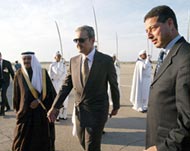Rabat forum to discuss reforms
US Secretary of State Colin Powell joins senior officials from the Group of Eight nations in Rabat, Morocco on Saturday to discuss reforms in the Arab world.

The Forum for the Future is being co-hosted by Powell and Morocco’s foreign minister, Muhammad Binaisa, and will discuss political and economic changes under way in the region.
Before Powell’s arrival on Friday evening, about 100 demonstrators gathered in front of the parliament building to protest against the American envoy’s visit, hoisting a banner that read: “No to the American imperialist forum!”
“We are here because we want another voice other than that of official Morocco to be heard,” said Amin Abd al-Hamid, head of the Moroccan Human Rights Association.
“We denounce Morocco’s organisation of this forum,” he said. “The Bush administration, which is the friend of the Arab potentates, cannot claim to be the harbinger of democracy.”
‘Show all cards’
Delegates to the conferences, mostly foreign and finance ministers, were being encouraged “to put all their problems on the table and foster a constructive dialogue,” organisers said in a statement.
 |
|
Saudi Foreign Minister Saud al- |
Under heavy security, the foreign ministers of Syria and Lebanon were among those gathering in Rabat for the meeting to discuss how to peacefully settle inter-Arab conflicts and improve regional cooperation.
Iran also was set to attend but withdrew at the last minute on Friday, said Nabil bin Abd Allah, a Moroccan government spokesman.
The conference is part of Washington’s Greater Middle East Initiative, which was unveiled in June at the G8 summit of major industrial countries comprised of Britain, Canada, France, Germany, Italy, Japan, Russia and the United States.
Democracy and development
The initiative urges Arab states to promote democracy, human rights and economic liberalisation. Saturday’s meeting is expected to deal with illiteracy in the Arab world, discrimination against women and efforts to create a better business environment.
But the issue of democratic reform is a sensitive subject among Arab governments – which are mostly autocratic and have been long criticised for providing their 270 million people with little or no voice.
Islamist activists and media in Morocco denounced the conference earlier this week as an indignity and “a humiliation of the Moroccan people”.
Some Arab leaders, including Egyptian President Husni Mubarak, have accused the United States of pursuing a hidden agenda at the talks.
French Foreign Minister Michel Barnier said the conference would produce a declaration that would focus on settling the crisis in Iraq and the Israeli-Palestinian dispute.